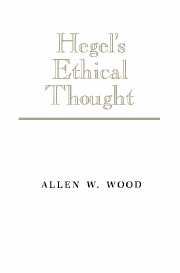9 - The emptiness of the moral law
Published online by Cambridge University Press: 05 June 2012
Summary
The emptiness charge
In Chapter 7 we reviewed some of Hegel's complaints against the moral standpoint from his Frankfurt writings: its alienation of reason from sense, its tendency to hypocrisy, its abstraction from the relationships of social life, its commitment to an “ought” which can never become an “is.” Hegel's best known criticism of morality, first appearing in the Jena writings, is the emptiness charge. It says that morality is doomed to be an “empty formalism,” that from the moral standpoint there is no criterion at all of moral right and wrong (PR § 135R).
The emptiness charge is sometimes presented specifically as a criticism of Kantian ethics, especially of the first formulation of the moral law in Kant's Foundations, the so-called formula of universal law (FUL):
FUL: “So act that you can will the maxim of your action to be a universal law” (G 421/39).
The charge is that the test proposed by the FUL draws no real distinction between maxims. From one point of view all maxims pass it, whereas from another any maxim fails it.
The emptiness charge is also presented as a more general indictment against the moral standpoint as a whole. In this version it claims that no “immanent doctrine of duties” can be formulated from the moral standpoint at all, because this standpoint provides nothing but an “empty principle of subjectivity” (PR § 148R).
- Type
- Chapter
- Information
- Hegel's Ethical Thought , pp. 154 - 173Publisher: Cambridge University PressPrint publication year: 1990

